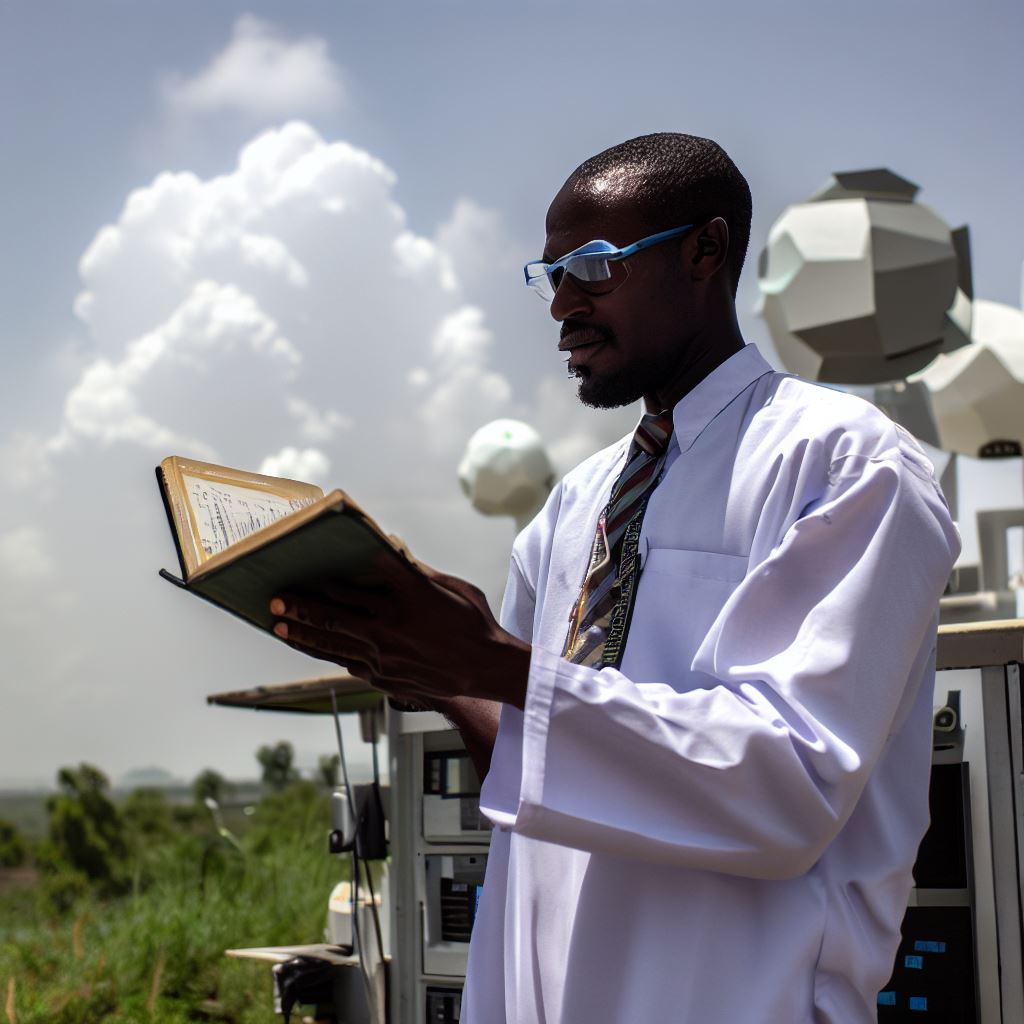Introduction
Nigeria, known as the “Giant of Africa,” has made significant strides in the space industry.
The country’s journey began in 2003 with the establishment of the National Space Research and Development Agency (NASRDA).
Since then, Nigeria has launched several satellites and developed space technologies.
Collaborations are pivotal in Nigeria’s space progress. They offer access to tech, expertise, resources, and foster knowledge sharing and skill development.
Nigeria’s space collaborations, like the one with China for NigComSat-1, have substantially advanced the country’s growth and commitment to space exploration.
Moreover, Nigeria has expanded its international ties by collaborating with other countries such as the United States, Russia, and the United Kingdom.
These collaborations have led to joint research projects, training programs, and the exchange of scientific data, further enhancing Nigeria’s capabilities in space exploration.
In fact, Nigeria’s international ties in space collaborations have played a vital role in its advancement and growth in the field.
These collaborations have enabled Nigeria to access advanced technologies and resources and have fostered knowledge sharing and skill development.
Moving forward, it is crucial for Nigeria to continue nurturing its international collaborations to further strengthen its position in the space industry.
Nigeria’s Space Industry Development
History and establishment of the National Space Research and Development Agency (NASRDA)
- In 1999, Nigeria established the National Space Research and Development Agency (NASRDA).
- NASRDA’s primary goal is to coordinate the country’s space research and development activities.
- The agency was created to harness space technology for national development and security.
Achievements and milestones in Nigeria’s space exploration
- Nigeria launched its first satellite, NigeriaSat-1, into space on September 27, 2003.
- This historic event made Nigeria the third African country to have a satellite in space.
- NigeriaSat-1 was designed for disaster monitoring, agricultural resource management, and urban mapping.
- In 2007, Nigeria launched its second satellite, NigeriaSat-2, which had higher resolution imaging capabilities.
- NigeriaSat-X, the third satellite, was launched in 2011 to enhance communication and disaster monitoring.
- These satellites have provided valuable data for various sectors like agriculture, environment, and security.
Challenges faced by the Nigerian space industry
- Funding is a significant challenge for the Nigerian space industry.
- Insufficient funding hampers the development of advanced technologies and expansion of space projects.
- Limited local expertise and reliance on foreign partners for critical aspects hinder growth.
- Infrastructure development is essential but requires substantial financial investments.
- Lack of public awareness and understanding about the benefits of space technology hinders support and funding.
- International collaboration plays a crucial role in overcoming these challenges and achieving space goals.
Nigeria’s space industry has made significant strides since the establishment of NASRDA.
The successful launch and operation of several satellites demonstrate the country’s commitment to space exploration.
However, challenges such as funding, expertise, and infrastructure development persist.
International collaborations hold immense potential in addressing these challenges and fostering Nigeria’s space industry development.
With continued efforts and support, Nigeria can further unlock the benefits of space technology for its national development and global collaborations.
Read: Education for Space Scientists in Nigeria: A Pathway
Importance of Collaborations in Space Exploration
Collaborations in space exploration not only benefit individual nations but also contribute to the advancement of humanity as a whole.
Here are some key reasons why collaborations in this field are crucial:
Enhanced scientific knowledge and expertise sharing
Collaborating with other countries allows Nigeria to share its scientific knowledge and expertise while also gaining valuable insights from international partners.
This exchange of information leads to a better understanding of space and the universe.
Access to advanced technology
Through collaborations, Nigeria can gain access to advanced space technologies that may not be readily available within the country.
This access allows for faster progress in space exploration by utilizing cutting-edge instruments and equipment.
Reduction in costs and shared resources
Space exploration is a costly endeavor. By collaborating with other nations, Nigeria can share the financial burden, making it more affordable for everyone involved.
Additionally, shared resources can be maximized, leading to cost-effective missions.
Strengthening diplomatic ties and international relations
- Space collaborations have the potential to strengthen diplomatic ties and build positive international relations.
- When nations come together for a common goal, it fosters trust, mutual understanding, and cooperation, which extend beyond space exploration.
In short, space collaborations yield benefits like enhanced knowledge, tech access, cost reduction, diplomacy, expertise, unity, and inspiration.
Nigeria’s international ties in space play a vital role in shaping not only the country’s space program but also contributing to the advancement of humanity on a larger scale.
Read: Space Technology in Nigeria: A Scientists’ Overview
Nigeria’s International Collaborations in Space
Collaboration with other African nations
Nigeria has actively pursued collaborations with other African nations in the field of space exploration.
One such partnership is with South Africa, where both countries have jointly established the African Resource Management Satellite Constellation Initiative.
This collaborative effort aims to enhance the capabilities of African countries in managing their natural resources using satellite technology.
By working together, Nigeria and South Africa are able to pool their expertise and resources to achieve common goals in space.
Similarly, Nigeria has also partnered with Egypt in various space-related projects.
The two countries have joined forces in the development of communication and Earth observation satellites, as well as in training their respective scientists and engineers.
This collaboration has allowed Nigeria and Egypt to leverage their strengths and share knowledge, ultimately advancing their space programs.
Partnerships with developed space-faring countries
Nigeria recognizes the importance of collaborating with developed space-faring countries to accelerate its space program.
The partnership with the United States, for instance, has been instrumental in the launch of Nigeria’s first satellite, NigComSat-1, in 2007.
Through this collaboration, Nigerian engineers gained valuable experience and technical know-how from their American counterparts.
Russia is another key partner for Nigeria when it comes to space exploration.
In 2019, the Nigerian Communications Satellite (NigComSat) signed an agreement with Russia’s Zheleznogorsk Satellite Control Center.
This was to enhance the management and control of Nigeria’s satellites.
This partnership ensures the efficient operation of Nigerian satellites and strengthens the country’s space capabilities.
Furthermore, Nigeria has been actively fostering collaborations with China in space technology.
In 2018, the China Academy of Space Technology signed an agreement with NigComSat to collaborate on the construction and launch of communication satellites.
This partnership not only promotes technological exchange but also creates opportunities for Nigeria to utilize Chinese expertise in advancing its space industry.
Participation in international space organizations
To further strengthen its international ties in space, Nigeria actively participates in various international space organizations.
- The country is a member of the International Astronautical Federation (IAF), a global network that promotes cooperation and exchange of ideas among space professionals.
- Through its membership, Nigeria gains access to valuable resources, expertise, and networking opportunities.
- Additionally, Nigeria is also involved in the United Nations Office for Outer Space Affairs (UNOOSA).
- UNOOSA serves as a platform for dialogue and coordination among nations in matters related to space.
- By being part of this organization, Nigeria can actively contribute to global discussions on space exploration, satellite technology, and space policy.
In essence, Nigeria’s international collaborations in space have been instrumental in accelerating its space program and enhancing its capabilities.
Collaborations with African nations, partnerships with spacefaring countries, and engagement in international space organizations drive Nigeria’s space exploration growth.
Leveraging partnerships and alliances, Nigeria pools resources, shares knowledge, and advances its space industry for its people and Africa.

Benefits and Impact of International Collaborations
Knowledge transfer and capacity building
- International collaborations allow for the exchange of knowledge and expertise between Nigeria and other countries.
- This knowledge transfer contributes to capacity building in Nigeria’s space industry.
- Through collaborations, Nigerian scientists and engineers have the opportunity to learn advanced techniques and best practices.
- Capacity building empowers Nigeria to develop and implement its own space missions.
- International collaborations also foster the growth of a skilled workforce in the country.
Infrastructure development and technological advancements
- International collaborations provide access to state-of-the-art infrastructure that may not be available in Nigeria.
- Through partnerships, Nigeria can leverage existing infrastructure in other countries for space research and development.
- Collaborations also facilitate the transfer of advanced technologies that can be adapted for Nigeria’s specific needs.
- Investments in infrastructure and technology contribute to the overall development of the country’s space sector.
Increased global recognition and participation
- International collaborations raise Nigeria’s profile in the global space community.
- Partnerships with established space agencies and organizations create opportunities for joint missions and projects.
- Being part of international collaborations enhances Nigeria’s credibility and influence in shaping international space policies.
- Increased participation in international space activities opens doors for future collaborations and partnerships.
Economic and social benefits for Nigeria
- International collaborations in space have the potential to generate economic benefits for Nigeria.
- Partnerships can lead to the creation of high-skilled jobs in the space industry.
- Collaborations can attract foreign direct investment and stimulate the growth of related sectors.
- Space technology applications developed through collaborations can have positive social impacts, such as improving disaster management and agriculture.
In review, international collaborations in space offer numerous benefits and have a significant impact on Nigeria.
Knowledge transfer and capacity building contribute to the development of a skilled workforce and empower Nigeria to conduct its own space missions.
Infrastructure development and technological advancements enhance the country’s capabilities and overall development.
Increased global recognition and participation raise Nigeria’s profile and influence in international space activities.
Lastly, collaborations in space can have positive economic and social outcomes, bringing opportunities for economic growth and societal improvement.
Nigeria’s participation in international collaborations is essential for the country’s progress in the space sector.
Read: Nigeria’s Space Missions: The Scientists Behind Them
Case Studies: Successful Collaborations and Projects
Nigerian Communication Satellite (NigComSat) project with China
One successful collaboration in space for Nigeria is the NigComSat project, which was done in partnership with China.
- This project aimed to develop and launch a communication satellite for Nigeria’s benefit.
- The collaboration between Nigeria and China allowed for the transfer of technology, expertise, and resources needed to establish a robust satellite communication system.
- Through this project, Nigeria was able to strengthen its telecommunications infrastructure, enhance internet connectivity, and improve broadcasting capabilities.
- The NigComSat project not only solidified Nigeria’s presence in space technology but also fostered diplomatic ties between both countries.
Joint space research programs with the United States and European Space Agency
- Nigeria has also engaged in joint space research programs with the United States and the European Space Agency (ESA).
- These collaborations have allowed Nigeria to gain access to advanced research facilities, scientific knowledge, and technical expertise.
- Partnerships with the US and ESA have enabled Nigeria to conduct vital studies in climate, weather prediction, and satellite imaging.
- These programs boost Nigeria’s science and diplomacy, strengthening ties with the US, EU, and other partner countries.
Training and knowledge exchange initiatives with South Africa
- Nigeria collaborates with China, the US, ESA, and South Africa in space technology.
- Training and knowledge exchange with South Africa enrich Nigeria’s space research and satellite tech.
- These collaborations have allowed Nigeria to build a skilled workforce in space science and technology.
- By leveraging South Africa’s knowledge, Nigeria has been able to expand its capabilities in satellite manufacturing, ground station operations, and data analysis.
- The training and knowledge exchange initiatives with South Africa have significantly contributed to Nigeria’s growth in the space sector.
Basically, Nigeria’s collaborations and projects with various countries and space agencies bolster its space technology development.
The NigComSat project with China has enhanced Nigeria’s communication infrastructure and strengthened diplomatic ties.
Joint space research programs with the United States and the ESA have allowed Nigeria to conduct crucial scientific studies while fostering international relations.
Collaborations with South Africa in training and knowledge exchange have contributed to Nigeria’s expertise in satellite technology.
Through these successful collaborations and projects, Nigeria has positioned itself as an active player in the global space community.
Read: Nigeria’s Space Programs: A Scientist’s Perspective
Challenges and Future Prospects
Funding constraints and sustainability
- Limited financial resources have hindered the development of Nigeria’s space collaboration efforts.
- Lack of adequate funding poses challenges in sustaining existing projects and exploring new opportunities.
- Government and private sector investments should be increased to support the country’s space endeavors.
- Collaboration with international partners can help secure funding through joint projects and initiatives.
- Establishing partnerships with organizations experienced in securing grants can also alleviate funding constraints.
Brain drain and retention of skilled professionals
- Nigeria faces a significant brain drain problem, where skilled professionals choose to work abroad.
- Limited career opportunities and inadequate infrastructure in Nigeria’s space sector contribute to this issue.
- Retaining talented professionals requires offering competitive salaries, career growth prospects, and supportive work environments.
- Collaborations with international partners can provide training programs and knowledge exchange opportunities.
- Implementing policies that encourage professionals to stay in Nigeria and contribute to the space industry is crucial.
Policy and regulatory framework improvement
- Nigeria needs to enhance its policy and regulatory frameworks to facilitate efficient collaborations.
- Clear guidelines and procedures should be established for international partnership agreements.
- Streamlining bureaucratic processes and reducing red tape can attract more collaborations.
- Regular updates and revisions of policies can accommodate evolving global space standards.
- Stakeholder consultations and collaboration with international experts can help shape effective policies.
Potential for future collaborations and expansion in the field
- Despite challenges, Nigeria has immense potential for future collaborations and expansion in space-related activities.
- Strengthening existing partnerships and fostering new alliances can promote growth.
- Leveraging Nigeria’s expertise in telecommunications and remote sensing can spur collaborations.
- Exploring joint research initiatives and space missions can expand Nigeria’s presence in the international space community.
- Encouraging indigenous innovation and entrepreneurship can lead to the development of satellite technologies and space services.
Essentially, Nigeria’s space collaboration efforts face challenges regarding funding, brain drain, policy framework, and regulation.
However, with increased investments, better retention strategies, improved policies, and strategic collaborations, the country can overcome these obstacles.
Nigeria has the potential to excel in space-related activities and expand its presence in the global space community.
By addressing these challenges and focusing on future prospects, Nigeria can realize its vision to be a significant player in the international space arena.
Delve into the Subject: Chemist Entrepreneurs in Nigeria: Opportunities
Conclusion
Nigeria’s space industry has made significant progress over the years.
From launching its first satellite, NigComSat-1, in 2007 to the development of the Nigerian Space Agency (NASRDA).
The country has shown its commitment to exploring and utilizing space technology.
International collaborations have played a crucial role in Nigeria’s space sector development.
Partnerships with countries like China, the United States, and the United Kingdom have provided technical expertise, advanced equipment, and funding for space projects.
These collaborations have helped Nigeria overcome challenges and accelerate its space program. The future of Nigeria’s space sector looks promising.
International collaborations can enhance Nigeria’s space exploration, satellite tech, and earth observation achievements.
Partnerships foster knowledge sharing, skill development, and resource mobilization, ensuring Nigeria’s space industry’s sustainable growth and success.
In closing, Nigeria’s space industry has come a long way and holds immense potential for further growth.
International collaborations have been vital, and with ongoing partnerships, Nigeria can advance in space tech and global science.




